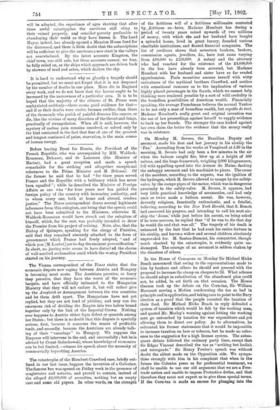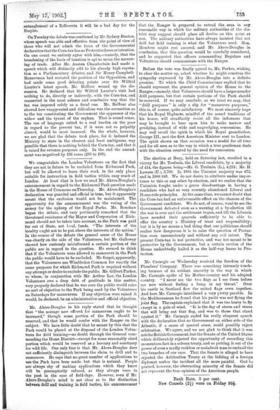In the House of Commons on Monday Sir Michael Hicks
Beach announced that owing to the representations made to him by bankers and others be should not proceed with the proposal to increase the stamp on cheques to 2d. What scheme he should adopt in substitution of the abandoned plan could not, he added, be set forth on that occasion. The House thereon took up the debate on the Corn-tax, Sir William Harcourt moving a Motion condemning the tax as bad in principle and in application, and taking care to point to the Bury election as a proof that the people resented the taxation of their food. Sir Michael Hicks Beach in reply defended a system of taxation which would be felt by the working man„ and quoted Mr. Morley's warning against letting the working men go untouched by taxation for war expenditure and yet allowing them to direct our policy. As to alternatives, he reiterated his former statements that it would be impossible to increase taxation on beer or tobacco, but he made no refer- ence to the suggestion for a high license system. The subse- quent debate followed the ordinary party lines, except that Sir Edgar Vincent described the tax as "nothing but foolish and retrograde." Sir Henry Fowler's speech was without doubt the ablest made on the Opposition side. We .sympa- thise strongly with him in his complaint that when in the future the • Colonies press us for preferential treatment, we shall be unable to use our old argument that we are a Free- trade nation and unable to impose Protective duties, and that therefore they must not expect us to give them special terms. If the Corn-tax is made an excuse for plunging -into tha
entanglement of a Zollverein it will be a bad day for the that the Ranger is prepared. to extend the area in any Empire.







































 Previous page
Previous page